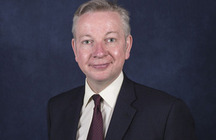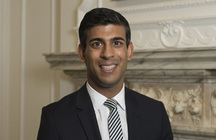Michael Gove – 2016 Speech on Anti-Semitism
Below is the text of the speech made by Michael Gove, the Secretary of State for Justice, on 15 March 2016.
Can I begin by thanking the Federal German Government, Chancellor Merkel, and my good friend, the British Labour MP John Mann, for the opportunity to speak here today.
It has been a little over five years since leading politicians came together for the second Inter-parliamentary conference on Combating Anti-Semitism, in Canada.
As we meet for the third such conference, our work is needed more than ever.
Because anti-Semitism is not just the oldest hatred, it is also a virus which mutates.
In the Middle Ages, anti-Semitism was focused on the religious identity of Jewish people and found its expression in forced conversion, ghetto-isation and expulsion.
In the nineteenth and twentieth centuries, it was the physical identity of the Jewish people that came under sustained attack. Pogroms and racial laws culminated in the unique horror of the Holocaust – history’s greatest crime.
The memory of that crime, and the appeal to all of us: ‘Never again’, generated a new determination to protect human rights and stood behind the creation of the state of Israel – a modern miracle.
But now – after horrors that should have meant this hatred was banished forever from human hearts – anti-Semitism is resurgent.
In the last year Jewish citizens of European nations have been targeted by fanatics simply because of their identity.
They were slaughtered because they shopped in a kosher supermarket, or volunteered to protect a synagogue.
One victim, Yoav Hattab, was the last of four hostages to die in the siege at a Jewish supermarket in eastern Paris, in January 2015.
Yoav, the student son of the Chief Rabbi of Tunis, was just twenty-one years old when he was shot dead by a killer who claimed allegiance to so-called Islamic State.
Witnesses said that this brave young man died trying to confront the gunman with a weapon he had discarded.
There is a reason that I mention Yoav in particular. Tragically, this was not the first time his family had been targeted.
In 1985, Yoav’s aunt was one of three worshippers shot dead in a synagogue on the Tunisian island of Djerba. She was just fourteen years old.
The gunman, a local police officer, opened fire with a submachine gun on people as they prayed.
Thirty years separate those deaths, and still Jews live in fear.
In France, recorded anti-Semitic attacks soared by 84 per cent in the first quarter of 2015, according to Interior Ministry figures.
In Britain, the number of anti-Semitic incidents recorded in 2015 was 924. This was the third-highest total ever, according to the Community Security Trust, a leading charity that protects British Jews from anti-Semitism and related threats.
Today, anti-Semitism targets the collective identity of the Jewish people. Jewish citizens of European nations are targeted if they dare to assert the dignity of their difference.
Synagogues and schools need security guards. Children wearing the kippah, or students meeting as the’ University Jewish Society’, face intimidation. And, of course, the most important expression of collective Jewish identity, the state of Israel, is faced with a campaign of prejudice against its very existence.
The BDS movement – urging the use of boycott, disinvestment and sanctions against Israel – claims to draw inspiration from the struggle against apartheid.
But the comparison is offensive. Israel is a democracy in which all citizens are equal: whether Jewish, Arab, Christian, Muslim, of Ethiopian heritage, Bedouin and Druze – all have the same votes and rights, which is why Arab Muslim politicians sit in the Knesset and a distinguished Arab lawyer sits on Israel’s Supreme Court.
More than that – the BDS campaign indulges prejudice rather than fighting it. It calls for the shunning of Jewish academics, the boycott of Jewish goods, the de-legitimisation of Jewish commerce. We have seen these all before. And we know where it takes us.
Modern anti-Semitism finds a home in far too many hearts. There are those on the radical left whose purported sympathy for Arab suffering never results in campaigning against Middle East autocrats, but always in opposition to Israel.
There are those on the extreme right whose dark prejudices have never been extinguished and who now use opposition to globalisation to revive old anti-Semitic tropes.
And there are Islamist extremists who want to undermine what they see as the Zionist-crusader state and rail against Jewish influence everywhere.
We need to stand against them all – and any who might be persuaded by their arguments – in solidarity with the Jewish people – and in solidarity with their right to national self-determination.
There is a duty on all of us in public life to speak out.
And to watch out for those with whom we might align ourselves
There is a particular duty on those of us charged with upholding justice to pursue justice in this cause.
That means asking how those who threaten Jewish lives, Jewish work and the Jewish people’s rights to self-determination – whether in Tehran or Tower Hamlets – can be confronted and held to account.
It also means – as the British Government has done – outlawing prejudice paid for by public money.
We have made clear that local authorities and public bodies cannot adopt BDS policies aimed at Israel; they cannot use public resources to discriminate against Jewish people, Jewish goods and a Jewish state.
The legal changes we have made follow a campaign led by the pioneering organisation, Jewish Human Rights Watch, which I wish to salute today. Its founding father Manny Weiss – the child of Holocaust survivors – has been a valiant campaigner against prejudice and his work has been recognised by our Government.
The Prime Minister, David Cameron, is clear that this is a battle he is determined to win. ‘We will fight anti-Semitism with everything we have got,’ is his vow.
‘Together, we will make sure Britain remains a country that Jewish people are proud to call home – today, tomorrow and for every generation to come.’
And I know that commitment to openness and tolerance – that belief in human equality and dignity – is shared by everyone here today.


